conductor
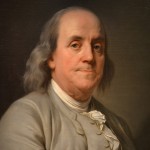 I don’t know of any family relationship that exists in my family or in Bob’s family, but I have always had an interest in Benjamin Franklin anyway. I have done a lot of hiking in my life, and sometimes, like it or not, bad weather comes in before we were done with our hike. I think anyone who has hiked much knows that one of your worst enemies on a hike…other than mountain lions, bears, or snakes…is lightning. Personally, when I start to hear thunder, I figure it’s time to head for shelter, but when you are four or five miles from your car, in the middle of a bunch of trees, heading for shelter isn’t always an easy task.
I don’t know of any family relationship that exists in my family or in Bob’s family, but I have always had an interest in Benjamin Franklin anyway. I have done a lot of hiking in my life, and sometimes, like it or not, bad weather comes in before we were done with our hike. I think anyone who has hiked much knows that one of your worst enemies on a hike…other than mountain lions, bears, or snakes…is lightning. Personally, when I start to hear thunder, I figure it’s time to head for shelter, but when you are four or five miles from your car, in the middle of a bunch of trees, heading for shelter isn’t always an easy task.
Ben Franklin, on the other hand saw lightning as a challenge to be explored. I think he had to have known the dangers of such an adventure, because he was a scientist after all. That didn’t really matter to him much, or if it did, he did not show it. Ben Franklin became interested in electricity in the mid-1740s. Not much was known about the subject, but he would spend the next decade conducting experiments using electricity. It was Ben who coined terms still in use today. You now them…battery, conductor, and electrician. He also invented the lightning rod, which is now used to protect buildings and ships. All of these things came from his many experiments. Ben Franklin was an amazing man, publisher, and writer, but it is really not in his writings that I find myself intrigued, but rather his electrical experiments. On this day, June 10, 1752, Ben flew his now infamous kite during a thunderstorm to collect a charge in a Leyden jar, when the kite was struck by lightning. He wanted to demonstrate the electrical nature of lightning.
Benjamin Franklin was born January 17, 1706. People might think that Benjamin Franklin was a highly educated man, but in reality, his formal education ended at age ten. Then he went to work for his brother, James as a printer, but after a dispute in 1723, he left Boston and moved to Philadelphia and found work as a printer. He moved to London for a short time and worked there as a printer, and then returned to Philadelphia. He became a successful businessman whose publishing ventures included the Pennsylvania Gazette and Poor Richard’s Almanack, a collection of homespun proverbs advocating hard work and honesty in order to get 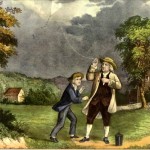 ahead. Eventually, Benjamin Franklin became an overachiever…or at least in the eyes of many people. I think he was just interested in a lot of things.
ahead. Eventually, Benjamin Franklin became an overachiever…or at least in the eyes of many people. I think he was just interested in a lot of things.
Of course, we all know about Benjamin Franklin’s career as a statesman, which spanned for decades, his years as a legislator, and his diplomatic years in England and France. He is the only politician to have signed all four documents fundamental to the creation of the US: the Declaration of Independence (1776), the Treaty of Alliance with France (1778), the Treaty of Paris (1783), which established peace with Great Britain, and the U.S. Constitution (1787). Yes, he was an all around amazing man, but I will always love the idea of his lightning experiments the best.
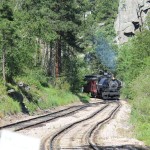 I read an article in the Casper Star Tribune yesterday that made me think about the many changes in the railroad over the years. When my grandfather, Allen Luther Spencer was working on the railroad as a carpenter during World War II, and for years before that, it took a number of people to run a train. The freight trains during World War II typically had seven people aboard…an engineer, conductor, up to four brakemen and a fireman. With all the trains that were running…not nearly as many as we have today…the railroad supplied a lot of jobs. This was just to run the actual train. The maintenance personnel, the station managers, and others who were required to keep the trains running smoothly, added to the number of people it took to ultimately move the trains along the tracks at any given moment. The trains of that era weren’t anywhere near as long as they are these days either.
I read an article in the Casper Star Tribune yesterday that made me think about the many changes in the railroad over the years. When my grandfather, Allen Luther Spencer was working on the railroad as a carpenter during World War II, and for years before that, it took a number of people to run a train. The freight trains during World War II typically had seven people aboard…an engineer, conductor, up to four brakemen and a fireman. With all the trains that were running…not nearly as many as we have today…the railroad supplied a lot of jobs. This was just to run the actual train. The maintenance personnel, the station managers, and others who were required to keep the trains running smoothly, added to the number of people it took to ultimately move the trains along the tracks at any given moment. The trains of that era weren’t anywhere near as long as they are these days either.
As technology became more sophisticated, fewer people were needed to run a train, and by the 1970s, the number of people on a freight train had dropped to five people, and by 1991, only the engineer and the 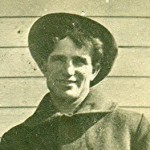 conductor were needed to run the train. When you consider that the trains have become so long that it can take twenty minutes to get the whole train through a crossing, that seems amazing to me. I guess it is amazing to a lot of other people too, because as the railroads are trying to eliminate one of those positions as well, a lot of people are quite worried about the safety of the trains. What strikes me as funny, however, is that the concern is that if they need to disconnect a car so emergency vehicles can get through, the engineer can’t leave his post to do so. I’m sure that in the future that part will be handled too, because technology is getting to the point whereby the train really could be run without a driver, just like the model trains are.
conductor were needed to run the train. When you consider that the trains have become so long that it can take twenty minutes to get the whole train through a crossing, that seems amazing to me. I guess it is amazing to a lot of other people too, because as the railroads are trying to eliminate one of those positions as well, a lot of people are quite worried about the safety of the trains. What strikes me as funny, however, is that the concern is that if they need to disconnect a car so emergency vehicles can get through, the engineer can’t leave his post to do so. I’m sure that in the future that part will be handled too, because technology is getting to the point whereby the train really could be run without a driver, just like the model trains are.
Much like the model trains, there is a controller at a central location who can see all the trains for his area. In reality, they probably could control the train with no one on it, but how strange that would be…especially when talking about passenger trains. But then, with subways, and airport trains, we often get on the train, and never see if anyone is running it. In airports, the voice telling you of your arrival is even 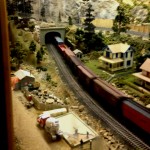 mechanical. I have to wonder if anyone is running those, and maybe someone out there will clarify that one for me. Someday, or even already, we will probably ride trains and never give a second thought to the fact that there is no engineer. Everything has become so technical, and we have reached a point of being so used to robotics, that we don’t even give a second thought to the aspect of someone being in control of this massive train we have just boarded…and people have said that flying is like being in a cattle truck. Turning control of our lives to someone we don’t know, or even to a robot, seems very strange, even today, but what would the people of my grandfather’s era have thought about having no one to run the train. I’m quite sure they would never have boarded at all.
mechanical. I have to wonder if anyone is running those, and maybe someone out there will clarify that one for me. Someday, or even already, we will probably ride trains and never give a second thought to the fact that there is no engineer. Everything has become so technical, and we have reached a point of being so used to robotics, that we don’t even give a second thought to the aspect of someone being in control of this massive train we have just boarded…and people have said that flying is like being in a cattle truck. Turning control of our lives to someone we don’t know, or even to a robot, seems very strange, even today, but what would the people of my grandfather’s era have thought about having no one to run the train. I’m quite sure they would never have boarded at all.

